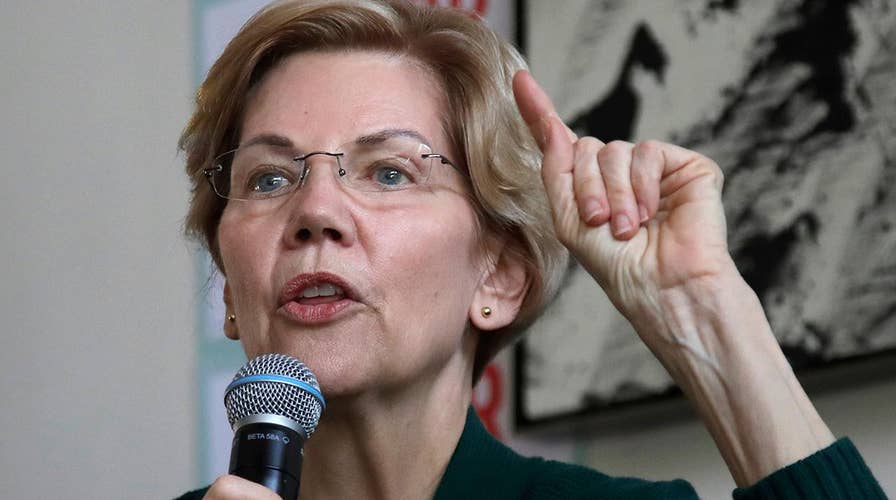Elizabeth Warren pledges to combat white supremacy
National security analyst Ryan Mauro weighs in on the fight against terror.
Sen. Elizabeth Warren says her presidential campaign brought in more than $6 million in the first three months of this year.
While respectable, the Massachusetts Democrat’s topline fundraising figure trailed significantly larger hauls by some of her rivals for the 2020 Democratic presidential nomination.
WARREN TAX RETURNS SHOW NEAR $1 MILLION INCOME
Warren touted that she raised $1.4 million in the final week of the first quarter of fundraising, which ended on March 31. And she spotlighted that she received more than 213,000 donations from 135,000 donors. Highlighting her grassroots appeal, the candidate said that 99 percent of her donations were $200 or less and that the average contribution was $28.
The big winner so far in the race for campaign cash is Sen. Bernie Sanders of Vermont. The independent senator, who’s making his second straight bid for the Democratic nomination, raised an eye-popping $18.2 million in the 71 days from his mid-February launch through the end of March. Sen. Kamala Harris of California brought in $12 million in the 70 days from her January announcement through the end of the quarter. And former Rep. Beto O’Rourke of Texas, who announced his bid in mid-March, hauled in $9.4 million in the first 18 days of his campaign.
BERNIE'S BIG BUCKS - SANDERS HAULS IN $18.2 IN FUNDRAISING
South Bend, Indiana Mayor Pete Buttigieg was the first 2020 Democratic contender to announce first-quarter campaign cash numbers. His $7 million haul was further evidence that the one-time long shot for the nomination was rising in stature and strength.
“I won’t sugarcoat it: We were outraised by some other candidates in the presidential primary this first quarter,” Warren campaign manager Roger Lau noted.
The populist senator’s haul is slightly ahead of Sen. Amy Klobuchar of Minnesota, who raised $5.2 million, and Sen. Cory Booker of New Jersey, who brought in $5 million. Both of those candidates launched their campaigns a month after Warren, giving them less time to raise money in the first quarter.
New York-based entrepreneur Andrew Yang reported raising $1.7 million. The remaining candidates have until the April 15 deadline to file their fundraising reports with the Federal Election Commission.
WATCH THE BERNIE SANDERS TOWN HALL ON FOX NEWS CHANNEL ON MONDAY AT 6:30 PM ET.
Campaign cash, along with polling, is a much-watched barometer of a candidate’s clout, strength, and popularity.
Warren, who’s making fighting corruption and big money in politics, announced in late February that she was forgoing "fancy receptions or big money fundraisers only with people who can write big checks," as well as phone calls with wealthy donors.
"Every time you see a presidential candidate talking with voters at a town hall, rally, or local diner, those same candidates are spending three or four or five times as long with wealthy donors -- on the phone, or in conference rooms at hedge fund offices, or at fancy receptions and intimate dinners -- all behind closed doors," Warren wrote at the time in an email to supporters.
On Wednesday, Lau touted that “because Elizabeth’s been able to count on grassroots donations, she’s been able to spend her time visiting as many states as possible, meeting voters, and calling grassroots donors to personally thank them for giving.”
And Warren’s campaign manager also targeted rivals with similar fundraising figures for relying on “big-dollar contributions.”
The campaign reported that Warren had $11 million cash on hand as of April 1, with a good chunk of that money transferred from Warren’s 2018 Senate campaign’s coffers.
Warren quickly came out of the gate after launching a presidential exploratory committee on Dec. 31. She grabbed lots of media attention and large crowds on the campaign trail in the first weeks of her campaign. She formally announced her candidacy at a large event in Lawrence, Massachusetts in February. The candidate’s also released a number of progressive policy proposals as she’s campaigned the past three months. But she hasn’t resonated in the polls, with her numbers in public opinion surveys hovering in the mid-single digits.






















